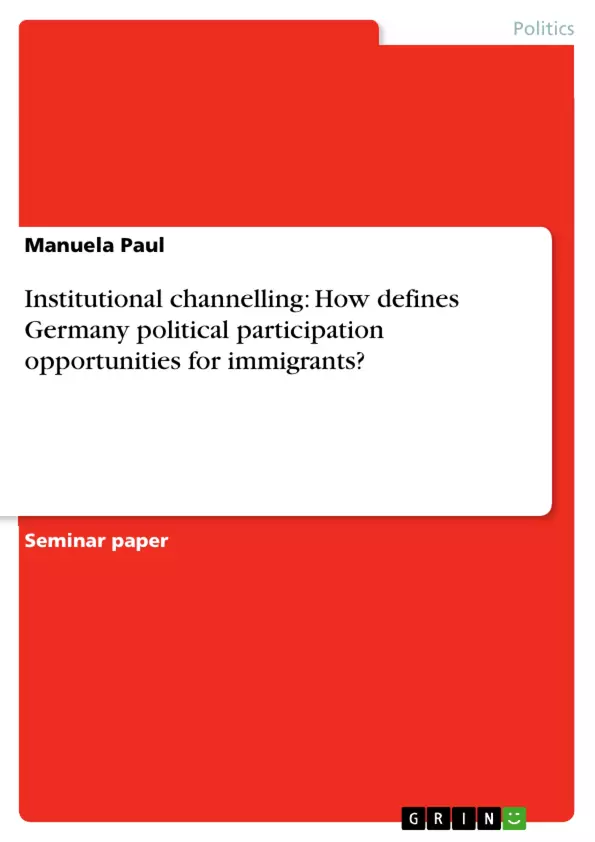The importance of immigrants’ active participation in German society is undoubtedly emphasized and supported by governmental authorities. However, the discourse produced by the state and political parties on immigrants’ participation is predominantly concerned with civic mobilisation and the involvement in organisations initiated by immigrants themselves. This paper addressing the less debated topic of immigrants’ political participation acts therefore as a counterbalance to these discussions.
In research special attention has been dedicated to the correlation between immigrants’ participation and integration. The widespread claim that ethnic and religious immigrant associations trigger segregation and hinder integration into German society has been refuted by recent studies affirming the incorporation of active immigrants (e.g. Thränhardt 1999). As immigrants’ participation has been proofed to be an important means to promote immigrant integration it deserves further academic attention. It appeals to me to observe and research immigrants as active, contributing individuals to our society. This perspectival manner of immigrants’ representation endeavours to distract attention from the mainly cultural and problematic discourse that exists concerning the issue of migration in Germany.
With the theoretical insights of Patrick Ireland among others the immigrants’ mobilisation research field has been expanded to the influence of the institutional setting provided by the German state granting political participation opportunities to immigrants. This paper will especially answer the questions how the institutions and practices offered by the German government influences the participation of immigrants in the political sphere. The first chapter deals with definitions and theoretical concepts aiming to clarify how specific expressions will be used in this paper. The third and the fourth chapter will then reveal what political participation opportunities are provided by the government in terms of state and non-state institutions and practices.
Inhaltsverzeichnis (Table of Contents)
- Introduction.
- Concepts and Definitions
- Conventional Participation Opportunities ..
- Non-conventional Participation Opportunities...
- Conclusion.....
Zielsetzung und Themenschwerpunkte (Objectives and Key Themes)
This paper explores the influence of German state institutions and practices on immigrants' political participation. It aims to counterbalance the prevalent discourse on immigrant participation, which primarily focuses on civic mobilization and self-initiated involvement. The paper examines the less-debated topic of immigrants' political participation, emphasizing the importance of their active role in German society.
- Immigrant political participation in Germany
- Influence of institutions and practices on immigrant participation
- Conventional and non-conventional forms of political participation
- Governmentality and the state's role in shaping participation opportunities
- The impact of institutional frameworks on immigrant political mobilization
Zusammenfassung der Kapitel (Chapter Summaries)
- Introduction: This chapter introduces the topic of immigrant political participation in Germany and highlights the importance of recognizing immigrants as active contributors to society. It discusses the need to shift the focus from cultural and problematic discourse surrounding migration to a more inclusive and participatory approach.
- Concepts and Definitions: This chapter defines key concepts such as political participation, conventional and non-conventional forms of participation, and governmentality. It explains how the state plays a crucial role in shaping political participation opportunities through its legal framework and governing techniques.
Schlüsselwörter (Keywords)
This paper explores the key themes of immigrant political participation, institutional channeling, German state practices, governmentality, conventional and non-conventional participation opportunities, and the influence of legal frameworks on immigrant mobilization. It examines the role of state institutions in shaping the political landscape for immigrants in Germany, shedding light on the complex dynamics of participation and integration.
Frequently Asked Questions
What is "institutional channelling"?
It refers to how state institutions and legal frameworks define and limit the ways immigrants can participate in the political sphere.
How does Germany encourage immigrant participation?
The government often focuses on civic mobilization and self-organized immigrant associations, though political participation remains a more complex issue.
What is the difference between conventional and non-conventional participation?
Conventional participation includes voting or running for office, while non-conventional participation involves protests, petitions, or community activism.
Does ethnic mobilization hinder integration?
Recent studies cited in the paper refute this, suggesting that active participation in immigrant organizations can actually promote incorporation into society.
Who is Patrick Ireland in the context of this study?
He is a researcher whose theoretical insights help explain how institutional settings provided by the state influence immigrant mobilization.
- Citation du texte
- Manuela Paul (Auteur), 2009, Institutional channelling: How defines Germany political participation opportunities for immigrants?, Munich, GRIN Verlag, https://www.grin.com/document/164069



